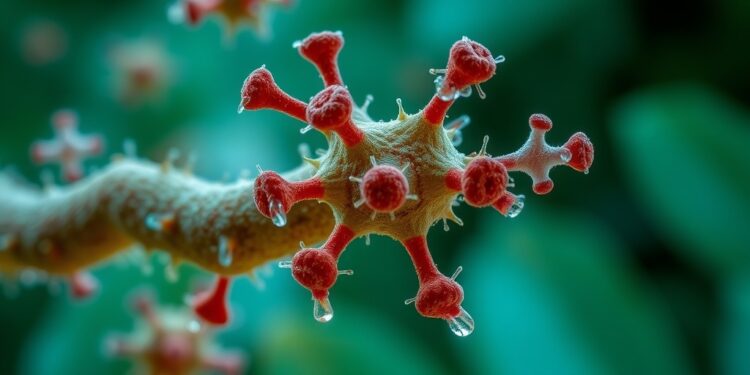The groundbreaking discovery that free fatty acid receptor 4 (Ffar4) plays a pivotal role in modulating dietary sugar preference through interactions with gut microbiota has unveiled a previously uncharted pathway in metabolic research. Published in *Nature Microbiology* on January 13, 2025, this research provides significant insights into the mechanisms behind sugar overconsumption and its link to diabetes, shedding light on potential therapeutic targets that could revolutionize the management of this global health crisis.
The researchers observed that Ffar4 expression is significantly reduced in both diabetic patients and diabetic mouse models. This reduction correlates with a marked increase in dietary sugar preference. Using a combination of systemic and tissue-specific knockout models, the study demonstrated that intestinal-specific deletion of Ffar4 in mice leads to a substantial decrease in *Bacteroides vulgatus* abundance and its metabolite pantothenate, a compound crucial for regulating sugar preference. In contrast, overexpression of intestinal Ffar4 mitigated sugar preference, underscoring its regulatory role.
Pantothenate, produced by *Bacteroides vulgatus*, was found to enhance the secretion of glucagon-like peptide-1 (GLP-1), a hormone known to influence appetite and energy metabolism. GLP-1, in turn, stimulated the release of fibroblast growth factor 21 (FGF21) from the liver. FGF21 acts on the brain to suppress sugar preference, establishing a novel gut–liver–brain axis that governs dietary behavior. These findings not only elucidate the complex interplay between gut microbiota and host metabolism but also highlight the potential of targeting this pathway for therapeutic interventions.
The study’s experimental design was meticulous, encompassing both human and animal models. Analysis of human peripheral blood revealed a significant downregulation of Ffar4 mRNA expression in diabetic patients compared to healthy controls. Furthermore, fasting blood glucose levels were inversely correlated with Ffar4 expression, reinforcing its metabolic significance. In diabetic mouse models, systemic knockout of Ffar4 led to a preference for natural sugars like glucose and fructose but not artificial sweeteners, suggesting that the preference is driven by metabolic rather than sensory pathways.
The researchers also employed co-housing and fecal microbiota transplantation experiments to confirm the role of gut microbiota in Ffar4-mediated sugar preference. Mice with Ffar4 deletions exhibited altered sugar preference when exposed to microbiota from Ffar4-intact mice. Similarly, restoring *Bacteroides vulgatus* in Ffar4-knockout mice reduced their sugar preference, highlighting the bacterium’s pivotal role.
To delve deeper into the metabolic underpinnings, the team conducted non-targeted metabolomic analyses of *Bacteroides vulgatus*. Pantothenate emerged as the key metabolite influencing sugar preference. Notably, diabetic patients and Ffar4-knockout mice exhibited reduced pantothenate levels, which were restored upon supplementation. Pantothenate directly stimulated GLP-1 secretion in intestinal cells, even in the absence of Ffar4, indicating its potential as a standalone therapeutic agent.
GLP-1’s role in this axis was further validated through pharmacological interventions. Administration of liraglutide, a GLP-1 receptor agonist, suppressed sugar preference and improved glucose metabolism in Ffar4-knockout mice. The downstream effects were mediated by increased hepatic FGF21 production, which acted on the ventromedial hypothalamus (VMH) to regulate sugar intake. These findings underscore the therapeutic promise of GLP-1 and FGF21-based interventions in curbing sugar overconsumption.
The study’s implications extend beyond diabetes management. By uncovering the gut–liver–brain axis that modulates sugar preference, it opens avenues for addressing other metabolic disorders linked to dietary habits. The identification of *Bacteroides vulgatus* and pantothenate as key players offers a promising target for probiotic and metabolite-based therapies. Moreover, the tissue-specific role of Ffar4 suggests that selective agonists could be developed to fine-tune sugar preference without systemic side effects.
This research also highlights the intricate relationship between genetics, microbiota, and dietary behavior. While previous studies have focused on the neural and sensory aspects of sugar preference, this work shifts the spotlight to the gut microbiome’s role. The discovery that Ffar4 regulates *Bacteroides vulgatus* abundance and pantothenate production underscores the microbiota’s central role in metabolic health. It also raises intriguing questions about the evolutionary and ecological factors that shape this interaction.
Despite its groundbreaking findings, the study acknowledges certain limitations. The mechanisms by which FGF21 acts on the VMH to suppress sugar preference remain to be fully elucidated. Furthermore, the interplay between the gut–liver–brain axis and other metabolic pathways warrants further investigation. The potential involvement of the brain’s reward systems, such as the endocannabinoid and dopaminergic pathways, in Ffar4-mediated sugar preference also merits exploration.
The translational potential of this research is immense. By targeting the Ffar4–*Bacteroides vulgatus*–pantothenate–GLP-1–FGF21 axis, novel interventions could be developed to curb sugar overconsumption and mitigate its metabolic consequences. Probiotics engineered to produce high levels of pantothenate, or synthetic pantothenate analogs, could serve as dietary supplements to regulate sugar preference. Similarly, Ffar4-specific agonists could be explored as therapeutic agents for diabetes prevention and management.
In conclusion, this study marks a significant leap in our understanding of the molecular and microbial mechanisms underlying sugar preference. By unveiling the role of intestinal Ffar4 and its interaction with gut microbiota, it provides a robust framework for developing innovative strategies to combat diabetes and other metabolic disorders. As the global burden of these diseases continues to rise, such insights are crucial for designing effective and sustainable interventions.
—
Subject of Research: Gut microbiota, dietary behavior, metabolic health
Article Title: Free fatty acid receptor 4 modulates dietary sugar preference via the gut microbiota
News Publication Date: January 13, 2025
Article Doi References: doi:10.1038/s41564-025-01378-9
Image Credits: Scienmag
Keywords: Sugar preference, gut microbiota, diabetes, Ffar4, GLP-1, FGF21, pantothenate, *Bacteroides vulgatus*, metabolic health, dietary behavior





